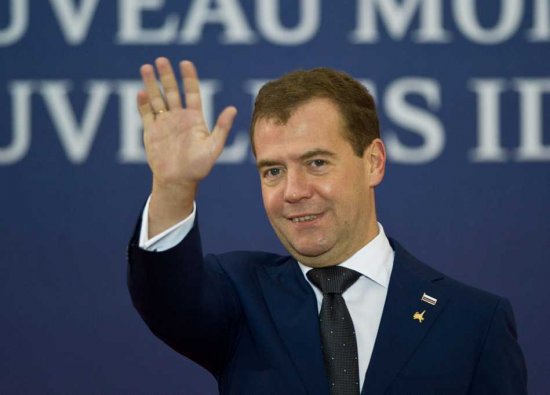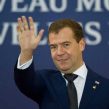
Russia Ponders the Eurozone Calamity
Publication: Eurasia Daily Monitor Volume: 8 Issue: 205
By:

President Dmitry Medvedev started his final round of top level meetings with the trip to Cannes where the leaders of the twenty largest world economic powers gathered to discuss measures to rescue the global financial system from the Greek crisis. The scale of the unfolding disaster is far greater than the pile of debt accumulated by negligent Greece, and the EU leaders are rightly embarrassed by the metamorphosis of their “model” union into the epicenter of economic disaster – and by their inability to handle the problem. Medvedev did not have much to offer and the sum of Russia’s possible contribution ($10 billion) is ridiculously inadequate, barely supporting the point that it is a part of the solution rather than the problem (Nezavisimaya Gazeta, November 1). The unsolicited advice about reducing budget deficits was hardly welcomed, but Medvedev’s argument that Russia was a part of Europe resonated particularly false because European politicians simply had neither the time for nor interest in his opinions (Kommersant, November 3).
A major development that could have illuminated Russia’s seat at the G20 table is the final resolution of the perennial problem of its accession to the World Trade Organization (WTO), but Medvedev was rather circumspect on this issue (www.newsru.com, November 3). According to Russian officials, all the difficult issues with Georgia were resolved by the end of October, yet Prime Minister Vladimir Putin remained reluctant to give the final word (Ekspert, November 3). He did not like giving up his power to erect protective tariffs and considered that his favorite project to upgrade the Customs Union with Belarus and Kazakhstan would suffer a setback; quite possibly he could not miss the petty triumph of joining the WTO against Georgian objections (Kommersant, October 28). Another meaningful contribution to calming down the European commotion could have been an agreement with Ukraine on gas trade and transit, but Moscow keeps trying to exploit the deepening political mess in Kyiv, while the EU amidst all the Greek troubles has found time to clarify its position on Ukraine (Nezavisimaya Gazeta, October 28).
Lacking serious things to say, Medvedev presented a rather dubious proposal for protecting intellectual property in the Internet but what was even odder was his attempt to position Russia together with “super-emerging” powers like China and apart from the depressed Western economies. He could have found a bit of comfort in the unusual behavior of the Russian market: the Moscow stock exchange, which usually falls deeper than Frankfurt or New York, registered only a modest drop last week and had a decent rebound. Some Russian economists suggest that the near-certain contraction in the eurozone would have a moderate impact on Russia’s growth (Moskovskiy Novosti, November 3). What undermines such a positive perspective is the massive capital flight; the Central Bank finally admitted the trend and doubled its estimate of the outflow to $73.6 billion in 2011, expecting it to continue next year (Vedomosti, November 2). The benefits for the EU are, however, limited because Russian companies lead among the exporters of corruption, according to the latest Bribe Payers Index compiled by Transparency International (Kommersant, November 3).
What has driven the aggravation of the European financial crisis and the marginalization of the European Commission is the quality of leadership; for that matter, concerns about Italy’s ability to service its debt are centered on the cavalier maneuvering of Prime Minister Silvio Berlusconi. Russia’s denial of and chronic unpreparedness for a new spasm of the crisis is also a function of the character of its stagnant leadership. Medvedev certainly cuts a very unconvincing figure at a gathering of real leaders and would hardly make a resourceful prime minister, a more serious consequence of his failed presidency, however, could be that the proposition of “modernization” has become discredited (Moskovsky Komsomolets, October 28). For now, Putin finds it useful to prop up Medvedev and pretends that the ultimate power is shared through a friendly division of labor; after the inauguration next May, he will hardly see any need in such misalliance but might find it convenient to put the blame for broken promises on his hapless junior partner (Nezavisimaya Gazeta, November 2). Meanwhile, he is busy travelling around Russia issuing these promises of wage increases and expanded social packages as if Russia is not facing the same prospect of falling revenues and irreducible expenditures that the EU is agonizing over (The New Times, October 31).
One significant difference in the manifestation of the unfolding economic disaster is the character of public protests. The emotionally charged anti-capitalist rallies that started in Wall Street and spread around Europe are absent in Russia, where a wave of nationalist demonstrations is gathering momentum culminating in the so-called “Russian marches” on November 4. Many liberal politicians and human rights activists are dismayed by this “street power,” while others are trying to downplay its xenophobic features and connect with the energy of the grass-roots anger (Ezhednevny Zhurnal, November 3). Putin is not averse to playing on nationalist feelings himself but he cannot reconcile this “patriotism” with the need to channel a disproportionate share of federal funds toward buying the loyalty of ruling clans in the North Caucasus, so the hugely expensive program for the “modernization” of this region has been quietly shelved (www.gazeta.ru, October 31).
The sharp escalation of the European crisis on the eve of the G20 summit has brought into focus one basic but normally hidden condition for its management: the smart political maneuvering and wise expert opinions could only work if a solid majority says “Yes.” The Greek referendum, whatever its fate, has forcefully re-established the simple fact that the decision on the future of every country belongs to its people. Putin has many instruments at his disposal to negate this fact, but the majority of Russians want to have a real choice in the presidential elections; they are also turning resolutely against the shameless corruption, which is a defining feature of Putinism. He might come to regret that this “No” vote cannot be expressed at the ballot box.




